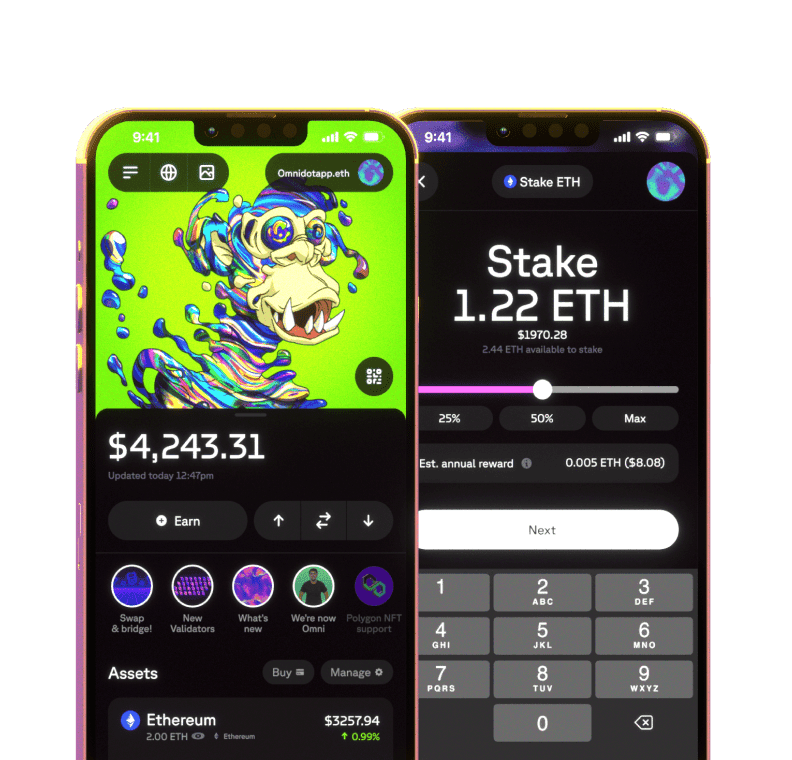What is a non-custodial wallet?
Omni is a truly self-custodial wallet, meaning that you have complete control over your crypto assets. Your keys = your crypto. While it may seem convenient for a wallet provider to be able to restore your wallet in the event that you lose your Secret Phrase, it is not in your best interest to trust a third party with critical information. It's important to opt for a non-custodial wallet like Omni to manage your crypto assets, as you will will be the only person who can access and manage your funds – and you will never need the permission of a third-party to do so.
Non-Custodial Versus Custodial Wallets
Non-custodial means that only you have access to your crypto assets, as you own the private keys. Since you are the only person who has the keys to your wallet, nobody can ever interfere in your ability to access you assets. If you want to access or move your funds, you are free to do so at any time without the need to offer personal information to or obtain authorization from a third party.
Opposite, a custodial solution requires you to interact with a third party to intermediate your funds. Custodial wallets are not owned by the user and you have to trust the party owning it, similar to the way a traditional bank operates. Not unlike a traditional bank, you are storing your funds in a digital safe and allowing someone else to hold the keys for safekeeping. Many centralized exchanges function this way to make their service more user friendly. While the use of a custodial wallet may take some pressure off of you and your personal responsibility to keep your private keys safe, it comes at the expense of basic security. Would you want to wake up one morning and see that you no longer have access to your funds? When you hold your assets in a custodial wallet, you run the very real risk of being locked out of your assets at any time, not to mention the risk of a hacked exchange. In the past, centralized exchanges have halted withdrawals of cryptocurrencies at times when there was a lot of demand, meaning you could withdraw your assets from the exchange to put to use or hold elsewhere. Holding your funds in a non-custodial wallet is an obvious choice.
And luckily, user friendliness at the expense of heightened security is not a sacrifice you have to make. At Omni, we combine user friendliness with a non-custodial wallet, bringing together the best of both worlds.
The importance of non-custodial wallets
The blockchain was birthed in 2008, just after a colossal market crash from the subprime mortgage crisis. This crash was attributed mostly to corruption among large centralized authorities including banks, which were granting loans to people who couldn't afford them out of greed. Instead of having to rely on a system that was inherently corrupt, the blockchain provided a trust-less alternative.
![[object Object]](https:////images.ctfassets.net/nccdc912q1to/4V9qrWrfQYQHFjusjQcUYh/1fe10987fb7252e81c636096c68f4160/non-custody.png)
Source: Chris Dixon on Twitter
Putting your funds in a non-custodial wallet means that you are not trusting any third-party with your funds - not even the company that built your wallet.
Today, while we have made a huge progress in blockchain adoption, many users continue to rely on central entities to manage their cryptocurrencies. This may seem harmless but there have been several instances in the past few months of central lending platform collapses, that dragged down their users' funds with them.
Central Platforms Versus Omni
On July last month, one of the largest cryptocurrency lending platform, Celsius, filed for bankruptcy after it halted customer withdrawals. Tragically, by the time Celsius had started showing signs of trouble, it was already too late for a lot of users who were immediately cut off from getting access to their funds. Celsius owes its users more than $4 billion following its bankruptcy, which many users expect to never get back.
![[object Object]](https:////images.ctfassets.net/nccdc912q1to/1ycHVwkn5UpdHc42NejmM5/9f5d0b1b749959274bdcf92c71fd8f37/Celsius.png)
Source: Celsius
A non-custody option prevents any platform from ever exerting its claim upon your funds, Omni included.
Keeping Your Secret Phrase Secure
Also referred to as a mnemonic phrase, mnemonic seed, or seed phrase, a Secret Phrase is a set of typically either 12 or 24 words, the unique combination of which is associated with a sole account. These phrases are used by wallets, such as Omni, to be written down by the user to safely back up the users' funds.
In the crypto ecosystem, most Secret Phrases are generated following the BIP 32 spec. The words are randomly selected from the BIP 32 English wordlist, and mostly the shorter, 12-word Secret Phrases are used, as the ultimate goal is for people to be able to remember the combination of words as opposed to a long, random string of letters and numbers (like a private key).
Your 12-word Secret Phrase is your Omni private key and it is your and yours alone. Given that Omni is a non-custodial wallet, we do not serve as an intermediary between you and your crypto assets. Only you will have access to your Secret Phrase and it is up to you to make sure that you keep it safe.
Make sure to backup your Secret Phrase right during the wallet setup process. If you put it off until a later time, you may forget to do so until it is too late. Make sure not to log out of your Omni without having backed up your Secret Phrase. It is recommended that you handwrite your Secret Phrase and store it somewhere safe to back it up, as this is the most secure method of backup. It is extremely important that nobody can see your screen when your Secret Phrase is exposed. You can also use a trusted password manager to backup your Secret Phrase, at your own discretion.
We call it a Secret Phrase for a reason – never share your Secret Phrase with anyone. If another person gains access to your Secret Phrase, then they have access to your Omni and gain the ability to move your funds.
The only way to restore your wallet is through your Secret Phrase. There is no way for Omni to help you recover your Secret Phrase if you lose it, so please make sure to backup your 12-word phrase and keep it safe with the utmost care. 🙏
I received an email or Discord message from Omni asking me to provide my Secret Phrase...
Omni will never ask you for your Secret Phrase. Not via email, not through Discord, not anywhere. We will also never ask you for any other personally identifiable information, such as your name or address. Please be aware of scams. If you ever have any concerns, please reach out to our team via support@omni.app
Airdrop Eligibility
An added bonus of opting for a non-custodial wallet solution like Omni? Qualifying for airdrops. 🪂 Depending on the airdrop, there may be specific requirements to fulfill, but Omni users have been able to qualify for and claim the many airdrops that have been announced (a number of which users have been eligible for by staking $ATOM via Omni).
You can check out the Omni airdrops page to stay up to date on the latest and greatest airdrops happening throughout the metaverse.
FAQ
What happens to my funds if a non-custodial wallet goes out of business?
Your non-custodial wallet does not have access to your private keys, which are the only gateway to your funds. Additionally, your non-custodial wallet does not store your funds. Instead your funds are store on the blockchain. You only need your private keys to import your funds into a different wallet. So, no matter what happens to the non-custodial wallet that you are using to access your funds, you will be able to easily migrate/ export your funds elsewhere.
How do I move my funds to a non-custodial wallet?
Moving your funds to a non-custodial wallet is very easy. On Omni, you simply create your account within a minute and tap the token you want to receive. This will direct you to the token's profile, where you can tap the 'down arrow' to copy your token address. You can use that address to fill in the send address field on the centralized platform you are sending your tokens from.

 Omni -
Omni -